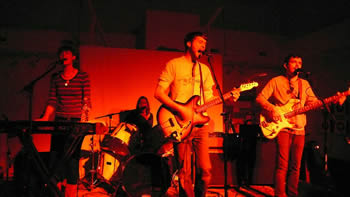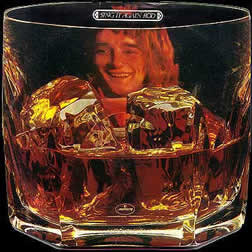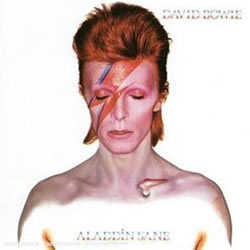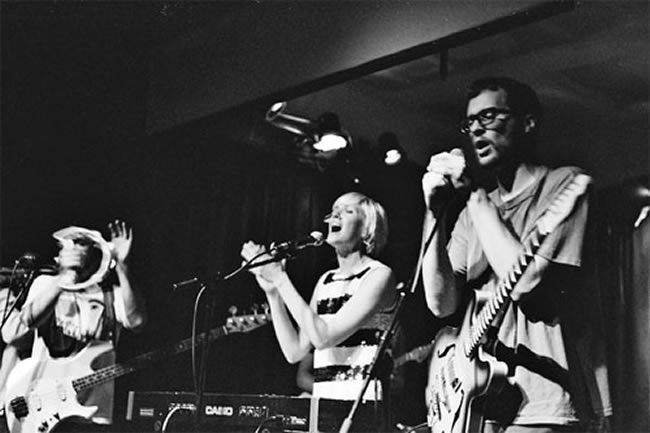Music
Bodies of Water Twists Again

Los Angeles band Bodies of Water released their third full-length album, Twist Again, in June. Bandleaders David and Meredith Metcalf recorded the tracks in their home studio (David discusses the positives and negatives of this below), and Pitchfork's review of the result described the album as filled with "confident, nuanced songs that incorporate elements of showtunes, disco, and folk, plus mariachi fanfares and hallelujah choruses." Propeller editor Lucas Bernhardt chatted with David Metcalf about the new album, "ominous domesticity," and the superiority of early 70s Rod Stewart recordings.
PROPELLER: Twist Again was recorded in your own home. What were the advantages and disadvantages of recording at home?
DAVID METCALF: It was nice to have a flexible schedule. I found myself working at unusual hours most of the time, and taking days or weeks off when I needed to. The main problem with recording in our house is that our next door neighbors (who have since moved) use to constantly scream at each other. For some reason, they usually did this while standing in the driveway, which is directly underneath the window of the room we recorded in. We had to plan on recording only when we knew they’d be inside the house or at work. We also had to account for the normal ebb and flow of neighborhood noise (which can get really loud where we live). 2:30 pm, for example, is when the school across the street gets out, and for the next hour and a half, the sonic landscape is dominated by shouting, car stereos, and ice cream trucks. We can’t plan on recording until at least 4:00.
 PROPELLER: The recordings sound so good—clean but not processed—I wonder if you ran into any walls, or if you were always able to get the sound you wanted.
PROPELLER: The recordings sound so good—clean but not processed—I wonder if you ran into any walls, or if you were always able to get the sound you wanted.
METCALF: Thank you! That’s the highest praise an engineer can ask for. I hadn’t ever recorded anything like this record on my own, so it took some getting used to. Since we recorded the bass, drums, and piano playing together in the living room, the instruments bled into each other’s mics quite a bit. We tried to make our own baffles by draping blankets over chairs, but this only helped a little bit. I also had a hard time miking the double bass. It’s a fickle instrument. The mic needs to be in exactly the right place or the sound will sort of disappear. In a few cases, I went back later and doubled the original bass part with a bass guitar to make sure that it would sound present enough.
PROPELLER: Twist Again is in some ways a very allusive recording. There are sounds, parts, and entire tracks that conjure up the music of disparate eras and genres. Was that intentional, or something that just happened during the recording process?
METCALF: Most of the time, it just happened. Since we hadn’t played most of these songs in public, we made the arranging decisions as we recorded. This creates a sort of domino effect, where one choice begets the next, but there’s no way to parse whether the logic of each step to the next comes from some kind of objective sonic compatibility, or whether their “rightness” is just familiarity with that combination of sounds. In most cases, both of these things are probably happening. I say “most of the time” because, in a few instances, we were a little more deliberate. The song “Ever With Us” may be the best example of this. The song is about a kind of ominous domesticity, and its harmonic foundation is in flux (the music changes modes and keys several times), so it seemed like a traditional, comforting arrangement would create a satisfying kind of tension. To that end, we tried to make it sound a little like an early ‘60s, Leiber & Stoller sort of recording, which, to me, is comforting. I don’t know if my relationship with this kind of music is typical…
 PROPELLER: One result is that the band doesn’t really have “a sound” on the album, but rather a collage of sounds. Does it concern you at all that BoW's music isn’t immediately identifiable by the first bar (the way many other bands are)?
PROPELLER: One result is that the band doesn’t really have “a sound” on the album, but rather a collage of sounds. Does it concern you at all that BoW's music isn’t immediately identifiable by the first bar (the way many other bands are)?
METCALF: I like a lot of records that have that quality to them, so I don’t think that’s necessarily bad. Os Mutantes & The Beatles were good at this sort of thing. Maybe this style of record is on the wane, though. There is so much recorded music floating around the world now that keeping an audience guessing may be commercially precarious.
PROPELLER: I’m someone who, out of habit, doesn’t usually pay attention to lyrics. Does it bother you that there are people like me in the world? Can you make a case for why I should be listening to the lyrics?
METCALF: It doesn’t bother me, but, seeing as how you Are a poet and a lyricist, I am surprised to hear this. Naturally, most lyrics are not worth paying attention to, but this is not always the case. Why don’t you pay attention to them? In the unusual instance that you do, what is it that triggers your interest?
 PROPELLER: I don't think I ever paid much attention to them. As a kid, I always had an internal dialogue going—and if I were listening to lyrics, I wouldn't be listening to the other me, which seems rude. The exceptions are personalities that make the lyrics unavoidable, like Hank Williams, Bob Dylan, Nico, or Floyd Jones. In general, though, I prefer to hear maybe one in every five words.
PROPELLER: I don't think I ever paid much attention to them. As a kid, I always had an internal dialogue going—and if I were listening to lyrics, I wouldn't be listening to the other me, which seems rude. The exceptions are personalities that make the lyrics unavoidable, like Hank Williams, Bob Dylan, Nico, or Floyd Jones. In general, though, I prefer to hear maybe one in every five words.
I remember sitting down with you once and listening to one side of several records all released the same year—1974, I believe. We were both surprised to find that the Rod Stewart record was the best of the bunch, and that the David Bowie release was clearly the worst. If someone were to repeat the experiment thirty or forty years from today, using only records released in 2011, which records do you think would surprise the future listener?
METCALF: It was ’73, because “Sing It Again, Rod” was the record we liked so much. Since this is the case, we were either listening to “Aladdin Sane” or “Pin Ups” alongside it. I suspect it was “Aladdin Sane.” I don’t remember the difference between the two being as stark as you do, but my recollections of this time are hazy. I’ve only heard to 2 or 3 records that were released this year, so I am almost completely unqualified to answer this! I haven’t kept myself deliberately ignorant of the zeitgeist, it has just worked out this way.
 We should re-listen to both of these records and see how we feel about them now. Who knows where our brains were at that morning? Things could sound very different now. (NOTE: I just gave them a quick once-over. Aladdin Sane definitely has a more "brittle" sound to it, especially after listening to that early Rod Stewart stuff. I've got to get back into Rod Stewart! I think that if I were listening to these at night-time, maybe in public, I would feel differently, but in my house this morning, I definitely prefer listening to Rod.)
We should re-listen to both of these records and see how we feel about them now. Who knows where our brains were at that morning? Things could sound very different now. (NOTE: I just gave them a quick once-over. Aladdin Sane definitely has a more "brittle" sound to it, especially after listening to that early Rod Stewart stuff. I've got to get back into Rod Stewart! I think that if I were listening to these at night-time, maybe in public, I would feel differently, but in my house this morning, I definitely prefer listening to Rod.)
PROPELLER: If someone were to liken “Mary, Don’t You Weep” to Edwin McCain’s “I’ll Be,” would you be mortified by the comparison?
METCALF: Would you believe that I’ve never consciously heard that song before? I just watched the video on youtube. It was a negative experience for me. I’m not mortified by the comparison, but they seem very different to me. “Mary, Don’t You Weep” is about single moms taking things one day at a time (I am not joking), while “I’ll Be” sounds like a stalker that’s finally worked up the courage to make a pass.
PROPELLER: What new projects are you working on now?
METCALF: We are about halfway done with another Music Go Music record. Also, I am making an album of semi-apocalyptic gospel songs with some other friends. Also, I am working with the choreographer Nick Duran on writing music for a dance-piece.
PROPELLER: I'm curious about these semi-apocalyptic gospel songs. Blind Willie Johnson has always been a favorite of mine, in part because he can give a song I've heard elsewhere and never thought much of an amazing, apocalyptic feel when he plays it. Also, I've always liked millinenarianism in literature, an when I've found other metaphoric uses of end times. In what way are you referring to the apocalypse, by which I mean: Is the world really ending?
METCALF: I don't know if the world is ending any time soon, the songs have just been ending up being about destruction of one sort or another. Bakunin said that destruction is creation, but I don't think he was ever able to verify that...
PROPELLER: Ian McEwan said that when he had children he chose to start writing about different subjects. I’m assuming he didn’t want to be thought of as quite so creepy any more. Does having recently become a father change the way you think about writing songs?
METCALF: It’s difficult to work on creating something without one’s thoughts orbiting around it all or most of the time. I imagine that Ian made this shift because he didn’t want to live in that head-space any longer. I don’t feel like I ought to make a similar adjustment, but it could be that I am unwittingly making one already. I have no answer for this! Ω



